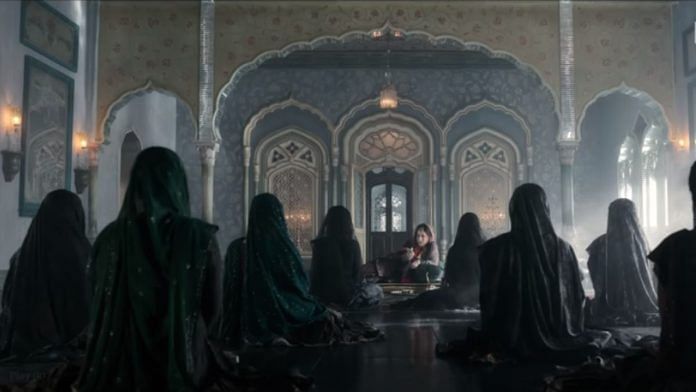In the run-up to the release of his Netflix series, Heeramandi, filmmaker Sanjay Leela Bhansali is being criticised and mocked on social media for being ‘obsessed with courtesans’.
He introduced Chandramukhi in his breakthrough film Devdas (2002) wearing a stunning red lehenga and dancing to Kahe Ched Mohe. His 2022 film Gangubai Kathiawadi is a visual extravaganza as Gangu (Alia Bhatt) fights for the rights of sex workers. And Heeramandi promises to be an opulent journey back in time to Lahore’s red-light district.
Bhansali’s films may be over-the-top, but by shining the spotlight on women who are otherwise forced to work on the edges of acceptable society, he gives them agency. He is justified in celebrating these women because they deserve recognition.
There was a time when courtesans were exceptionally skilled women who thrived even if not defined by popular culture, art and music. They were the gatekeepers of etiquette and refinement but were reduced to mere performers with the arrival of the British and the decline of royal households and patrons.
What most people know of them today is primarily through Bollywood. I hope that films and shows like Devdas and Heeramandi will prod the audience to do some reading and digging to get an understanding of the evolution of the courtesan culture in the Indian subcontinent.
Also read: The Beckhams’ PR game is on track. Victoria’s 50th birthday was a pop culture moment
A comparison
The Indian film industry has always been fascinated by courtesans. Movies like Pakeezah (1972) and Umrao Jaan (1981) remain relevant even today. In Pakeezah, a courtesan, Sahibjaan (played by Meena Kumari) falls in love with a forest ranger. But his parents oppose this love. On the other hand, in Umrao Jaan, Amiran (played by Rekha) is trafficked to a brothel by a corrupt police officer following her father’s testimony against him. Over the years, she flourishes as Umrao Jaan—a poet and courtesan.
Filmmakers like Bhansali aren’t afraid to dig into their stories and force the audience to confront the uncomfortable realities of a society, which both idolises these women and also pushes them to the sidelines.
These films force us to question the systems of exploitation that allow powerful men to manipulate and discard women at will. By placing the lives of these women at the centre of cinema, filmmakers like Chander Vohra, JP Dutta, Abhishek Varman and Srijit Mukherji upend the negative narrative built around courtesans. But, Bhansali does it better.
Varman’s Kalank (2019), for example, was all things grand but it couldn’t do justice to Bahaar Begum, a courtesan (played by Madhuri Dixit). Dixit’s performance was limited to two songs and some dialogues in a mix of Hindi and Urdu, which made the character underwhelming. Ultimately, Kalank ended up feeling like a wannabe Bhansali film. Conversely, in Devdas, Bhansali crafted Dixit’s Chandramukhi by blending strength and fragility, adding depth and significance to her portrayal.
In the film, there is a scene where Chandramukhi is outed as a courtesan, and humiliated by a man who is a frequent visitor to her brothel. Chandramukhi confronts the hypocrisy of the situation, creating one of the film’s most powerful moments. Her bold stand, even slapping the man for his disrespect, highlights her strength and determination to reclaim her power.
Mukherji’s Begum Jaan (2017) – following a familiar storyline of Heeramandi – creates a mockery of itself. Begum Jaan (played by Vidya Balan) is a madam of a brothel, who is asked to leave as the East India Company decides to draw a division line in Punjab. Though the story had a compelling narrative, the cliche characters ruined the experience.
Bhansali is also accused of promoting prostitution through projects like Heeramandi. But for the record, courtesans held prominent positions in high society— they were not performers for men as filmmakers often depict them.
It is high time we realise that movies and shows like Heeramandi are celebrating a crucial but often overlooked slice of our history.
Views are personal



